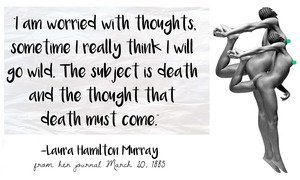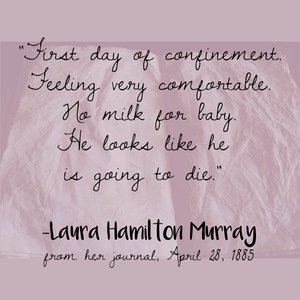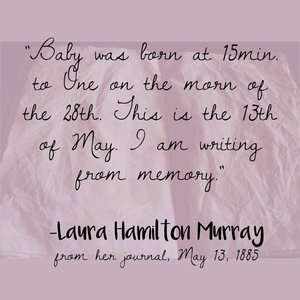Laura Hamilton Murray: Owning her Emotions; Journaling the Black Female body
One of the first entries-if not THE first entry from Murray's journal.
It’s been very interesting reading through samples of Laura Hamilton Murray’s diary from various sources. I connect with her like she’s a distant relative. Her journal is comprised of brief, documentary-style entries which serve as archival reviews of her new marriage, transitioning to life in a new town with a new culture of Blackness, her days as a housewife, and family finances.
Murray was born in Mercer County, OH– a county characterized by a mix of freed slaves and abolitionists, where she met and married her husband at age 19. After marrying, her husband moved them to Alexandria, VA.
And this is where we have an “in” to Laura’s life because this is where her journal begins. Via simple language and an observant naïvite, we today now have a handwritten window through which we can see Laura transitioning into a new place, new life, with new duties and new physical experiences via pregnancy. For me, her journal’s innocent outpours demonstrate how simple journaling can be while still becoming an inherritance in a simple but powerful form: it lets posterity see how their ancestor felt.
Without qualm, I would call Laura Hamilton Murray’s writings dark. Dark because she was wife and mother and expressing in writings things that “good” wives and mothers aren’t “expected” to express. The modest but blunt writings are brutal on my cerebrum for reasons I really can’t pronounce. Perhaps it’s because, in my own mind, I found myself shivering and wanting to silence Laura. I found myself hissing things in response to her words like “Hush! Don’t say such things! Don’t SAY that you’re feeling that! You’re a mother! You’re pregnant! Get gushy and feel fuzzy like you’re supposed to!”
And then I realize that this is perhaps why she journaled. Perhaps this is why we journaled. Why we still must journal… Because our truest selves feel things that society deems unutterable, if not irresponsible, despite their belonging to us. Our freedom of expression is really no freedom at all but limited to what the world around us is currently curating. And this is why we must keep journals. In Laura Hamilton Murray’s journal she was free to feel and recover and deal with the brutalities of becoming without judgement guaranteed if she were to verbally express them.
I can only imagine what she was going through, being newly married, newly transplanted, pregnant, and a Black woman. Nevertheless, I am happy to read Laura’s rawness in processing this darkness. A strange way to process hope, I find consolation in reading how someone coming so far before me expressed herself so authentically. There’s an element of freedom in this.
Don’t be afraid of your dark. It may be the only light your posterity needs to keep going.
I can’t help but wonder if other women in Laura’s community/ day had an ecosystem of feelings similar to hers but lacked the courage– or literacy– to express…
I’m very inspired by Laura Hamilton Murray’s fearlessness in confronting feelings about death in her journal writings. The ease with which she seems to address the “taboo” (back to what’s “expected” of a Black/female/“good” Christian/woman) lends perspective to her being an anomaly amongst her peers at that time. When you spend time being honest with your soul you’re the worst candidate to live a lie. I can imagine Laura steering from the dishonest reflection self-censorship as she wrote the nastiness of her truths, her sacrilege questions and “un-womanly” doubts–I wonder if such entries made her feel free?
As I read through Murray's journal I detected strong hints of pre-and postpardum depression in Laura Hamilton Murray’s words. I cannot say for sure and I don’t know if there was a name for it then, but I greatly admire her strength in writing through this journey, capturing how these feelings manifested through her.
I wonder if it eventually got easier for her? Laura would eventually have 5 children…
I don’t want my progeny to feel that I as their ancestor was without emotional blemish or concerning brood. Your children’s children need to know you felt, pondered, and battled with certain things so they don’t castigate their own journey and pursue false lives they consider “normal”.
Where are OUR Journals? is an ongoing project unearthing the writings
of teastained women's journals.








